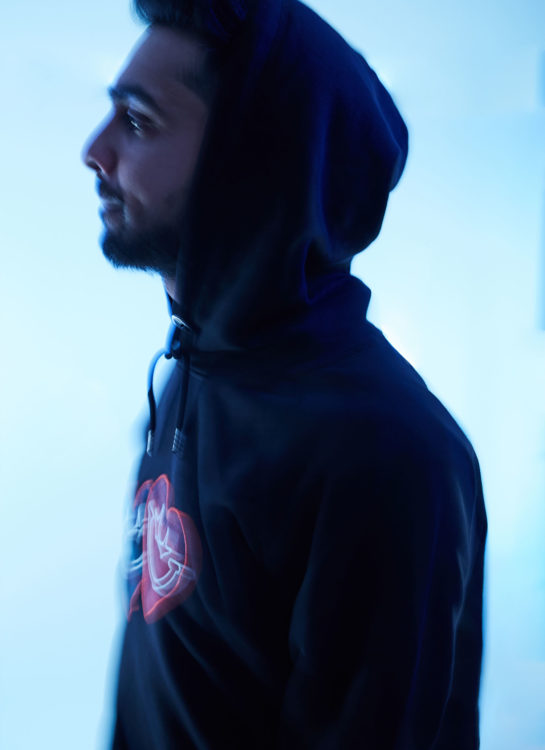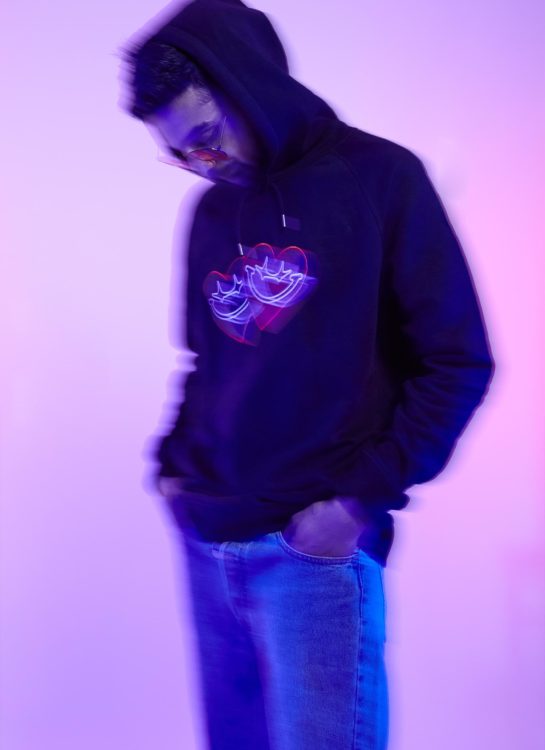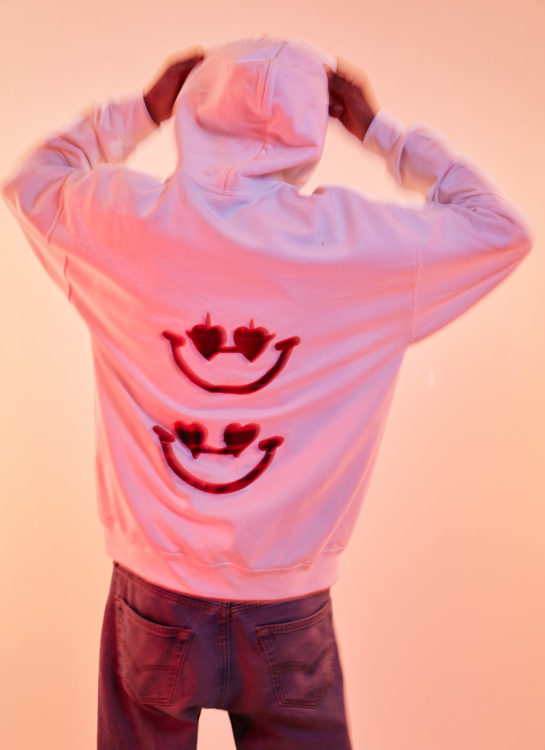- Words Georgia Gane
- Photography Dav Stewart
- Production Studio Notion
Rising producer/rapper, Surya Sen, talks about leaving a job in finance to pursue his musical dreams, advice for his future self, upcoming debut mixtape, and much more.
Sometimes, external pressures from schools, media or our families can set us on the seemingly right, yet very wrong career path. It can leave us stuck in a routine and a job we don’t like, until we find ourselves one day questioning ‘wait, what the fuck am I doing here?!’. Thankfully for our ears, producer-rapper Surya Sen experienced this moment at the beginning of the UK lockdown, took the plunge in his music career and hasn’t looked back since.
Named after the Bangladeshi school teacher turned revolutionary leader, Surya Sen dropped his first single “C U Later” during the pandemic. Despite being new to the music scene, from a young age Surya Sen was not only listening to his favourite music, whether that was deep house grooves or golden era hip-hop, but also studying the samples and tracing their origins. From here, Surya learned to sample music and began creating his own, where his vast musical knowledge is clearly heard through his talent to blend different styles of music seamlessly.
His characteristic fusion of rap, hip hop, UK garage and house while sounding distinctively British is part of his mission to do something new with UK electronic dance music. “There hasn’t been a change in electronic dance music on radio in so long. In the UK when Krept and Konan’s ‘Don’t Waste My Time’ came out in 2015, it was this huge moment and since then so many artists have a variation of that sound. They’re all moving the needle further from that Krept and Konan tune. But that same thing hasn’t happened in dance”, Surya Sen says.


Alongside this, and in keeping with his namesake, the North London native knew from the offset that he wanted his music to express what it means to be British Bengali in London today – an experience that has been somewhat underrepresented in UK music until more recent years. Discovering the Daytimers collective and being involved in a community of South Asians in electronic music spurred Surya to pursue his career in music even further: “At the end of Yung Singh’s Boiler Room, I recorded Riva [from Daytimers] saying, ‘shout out to all the South Asian massive’, and it’s actually the last moment in the mixtape. I wanted to just show how far we’ve come”.
We caught up with Surya Sen to learn more about the hustle thus far to make his music dream a reality, his musical influences and the important stories told in his upcoming mixtape, ‘At What Cost?’, out 29th April. Surya will be revealing the tape at his sold-out Launch party two days before, at The Glove That Fits on the 27th April.


Talk to me about your journey into music so far. When did you decide that you’re gonna pursue music in a real way?
So I worked in finance for like 7 years and I’d been doing beats as a hobby for years. Madlib and East Coast hip-hop beats were my thing, I’d just make those beats as a hobby or I’d do beat placements for a couple of my friends like Bone Slim. Then it was in lockdown, I kind of realised, what am I doing with my life? I thought my career choice was what I was supposed to be doing but it clearly wasn’t. When I turned 26 I was like, Jay-Z put out ‘Reasonable Doubt’ at 26, and Kanye did ‘College Dropout’ at 27, so I was like ok, this is one last shot if you actually want to do it. Then my brain started, I guess half romanticising it but half also trying to figure out the steps and what I would do, how I would fit, and where I could fit. During the pandemic, I’d put out the song “C U Later” which was my first song. Then off the back of that, a lot of label conversations took off and then I signed [with Skint Records].
I found it so mad when I read that you guessed the president of Skint’s email? How did that come about?
Yeah, it was that level of shit, man, it was crazy. I was approaching every label, so when I used to work in the office, the Ministry of Sound office was near and I used to wear a suit to work and stuff. I used LinkedIn heavily and I’d do all this crazy shit, man. I’d find someone’s name on LinkedIn and pretend I had a meeting, I had my suit on and had my actual work business card and just go into the office and be like, ‘hi, I’ve got a meeting with this dude’ and they’d be like, ‘yeah ok, you seem official’. That was Ministry though, Skint I just guessed the email.
So you just went in there and talked your way through the meeting?
Yeah a bit, but my drive was really obvious. You could really see it from the get-go. It was organic in some ways but it also took a lot of me shouting and screaming about it. Something I learnt in that journey was that if I didn’t do it, it wouldn’t happen. And that was my mentality.
What made you want to sign with Skint?
A big part of joining Skint was that their sound was a big part of why I wanted to do music; Fatboy Slim is one of my heroes. They understood this new hybrid, and the hip-hop that I’m into is very similar to some of the samples that Fatboy Slim would be using, so they really understood it from that perspective. But also they let me clear samples, and obviously because Fatboy Slim has got a shit load of samples in his work, so I was like, well then me using samples isn’t a big deal. And Skint is so legendary that I felt like it would be a good place to try and do something fresh and new. They really understood my ambitions and what I wanted to do, you know? So we just rolled with it.
Who else would you name as big musical influences for you?
Ah there’s loads. In that space, a lot of the house heads, like Kerri Chandler, Ron Trent, I really liked that sort of deep house. But away from that, a lot of East Coast early hip-hop. Nas’s ‘Illmatic’ is my favourite album of all time. I fell in love with that first but then I was going backward to find out the producers on it. When I was like 14/15, I’d go through ‘Illmatic’ and be like oh crap, Premiere did that beat, Q-Tip’s on this beat, you know?
It’s a weird one because at that same time I was infatuated with Madlib beats and Dilla beats, I’d also be raving quite a lot and that was a staple in my life, from 17/18 to now. So I’d see a lot of these electronic acts but the ones that fascinated me most were the ones that were doing dance music but with samples. Avalanche is a big influence of mine, DJ Shadow as well. The idea of taking a sound and manipulating a sample – I know it’s like a hot topic in the UK music industry at the moment because a lot of pop records are sampling older records, but for me, it’s why I wanted to do music.
When you were learning how to produce and sample, were you teaching yourself? Did you have any background in music or music theory?
Zero. When I got into beatmaking, I bought a sampler called the Roland SB404. I had that and a portable turntable and then I’d love to just dig for records, and sample directly from a record you know? It’s like the tangible element of it, of going to a charity shop buying a record and then using that. So yeah, no music theory whatsoever, just teaching myself really.


Have you managed to leave your job yet by the way?
Yeah, yeah. It was perfect, it was all planned out. My notice period finished and two days later I signed. Then this last year it’s just been working on music full time.
Congratulations, I love that.
Thank you! To be honest, I didn’t expect it to actually happen. I was definitely going for it and was like, I’m going to make this happen, but it was kind an illusion as well, you know?
Yeah, especially if you didn’t have anyone in your immediate circle or your family with that career, and if you don’t see it close to you, it’s understandable that you’re unsure if it’s a possibility.
Yeah, it doesn’t exist in my family. No one in my family is musical. My brother works in tech, my sister is a doctor. That was another big part of why I wanted to do music as well. I’m Bangladeshi, and it just doesn’t really exist. There are obviously Bengali rappers, I’m sure, but I just felt like there wasn’t someone that had remnants of a London upbringing and I didn’t really know many Bengalis like me that love hip-hop and love dance and want to rap. And a lot of Bangladeshis who are in the music industry are usually in the back end of it, so the journalists, writers or video editors, you very rarely get acts who are at the forefront. This turned into a need to give it a go. For something bigger than me. That’s something that I outlined from the offset, if I was gonna do it I wanted to shift the needle for British Asians in music.
Let’s get into your upcoming debut mixtape, how would you describe it?
It’s supposed to be one night in London, post lockdown. It was a weird one though because it was like, what do I make a mixtape about? What is it that am I trying to share? The thing that was overwhelming was, I guess what I am is just a Londoner. And the other thing is that globally, there’s a bit of a warped understanding of the UK – we’ve got one of the best clubbing scenes in the world, and it isn’t ever really shown to a US audience that we know how to party. I wanted to show this is what it’s like on a night out in London.
But within that, there’s a B-side story of the skits with this American businessman who’s just done a deal to expand the Truman Brewery in Brick Lane into a shopping mall and drive out a lot of the local Bangladeshi community. I wanted to talk about that and the gentrification of London as well as what a Bengali heritage in London is.
Whilst this night is happening, this American man is on the phone and that leads into the song where I’m rapping in Bengali. That song is very much about the immigration of Bangladeshis to London and talking about the national front and racial killings in 1978 and being proud. I’m a Londoner but I’m very much proudly Bangladeshi as well and this is what Bangladeshis had to go through when they came over here. So it touches on that as a side story.
Such a cool idea to intertwine those stories. Especially since you said you went into it unsure about the concept for the project – I think you smashed it.
I’m really into movies as well, so I wanted to make it like a Tarantino x Guy Ritchie 27 minute mixtape. There was this video of a club called Shelley’s in Stoke in the early 90s and they’re just raving and it’s so beautiful. I came across it when we couldn’t go out and my hair just stood up for how much I missed hearing really amazing music in a club, and feeling the music and dancing. I was looking at this video and I was just like, shit man, I wish I was partying.
It’s interesting that when you started pursuing music seriously, it was over lockdown when the nightlife/music scene wasn’t active. How was that experience?
It just gave me a chance to remember all the stuff that I really missed. I wanted to recreate that feeling in this mixtape; being outside a club or walking out of the station and talking to your mates about something and the excitement that is in the air. There’s a lot of carefully selected sounds of the tube and of nos balloons and all those sounds you can hear when you’re out. It gave me a chance to realise what I really missed about it all? Including the tube. Man, I missed the tube.
What advice would you give to your younger self?
Happiness is really important. I feel like people do things at the expense of their happiness without even knowing it. I was going through quite severe mental health problems at this time when I was like, what am I doing with my life? It’s so important for you to do something that you’re happy doing. And whilst it is good to always be planning for the future, it’s really key to be happy. Shout out my brother who pointed that one out.
What do the next 5 years look like for you?
Honestly, this sounds weird but I wanna continue making it up on the spot. Just going with it, but also still trying to make an impact in music. Music is really important. You can’t keep it stagnant, it has to keep moving forward. But also I quite enjoy the label side of stuff. I didn’t have a manager for a while, so me trying to get signed and understand what anything meant, I was just doing it myself and I really enjoy it. Also doing more stuff in fashion, whether that’s having a label or getting more involved in that world. And make innovative music.
And being happy.
And being fucking happy! That’s it.

